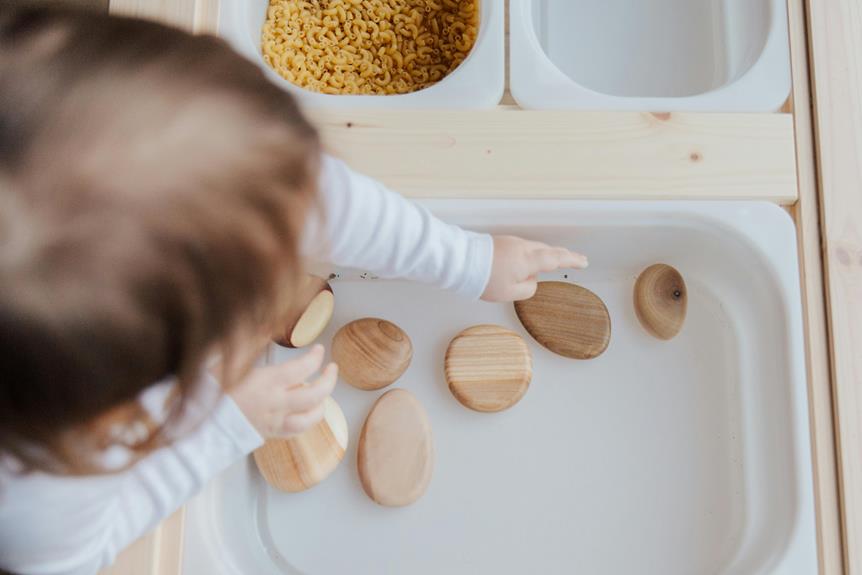Enhance your baby's skills with Montessori-inspired toys that boost cognitive development, foster independence, and promote hands-on learning. These toys not only stimulate problem-solving skills but also encourage sensory exploration and enhance fine motor skills. By using Montessori toys, you can support your baby's physical and cognitive growth while enhancing their cognitive abilities and memory retention. Explore further to discover the top Montessori toys that cater to sensory development, fine motor skills, problem-solving, and cognitive growth.
Benefits of Montessori-Inspired Toys
Discover how Montessori-inspired toys can enhance your baby's cognitive development and foster independence. Montessori toys are carefully designed to promote hands-on learning, problem-solving skills, and sensory exploration. By engaging with these toys, your baby can develop essential cognitive abilities such as concentration, memory, and fine motor skills. The interactive nature of Montessori toys encourages active exploration, helping your baby learn through sensory experiences and trial-and-error.
Furthermore, Montessori-inspired toys are specifically crafted to promote independence in young children. These toys often come in simple designs that allow babies to manipulate and explore them on their own. By playing with Montessori toys, your baby can learn to make choices, develop decision-making skills, and build confidence in their abilities. This independence fosters a sense of empowerment and self-reliance from a young age, setting a strong foundation for future learning and development.
Top Montessori Toys for Sensory Development
Enhance your baby's sensory development with these top Montessori toys designed to stimulate their senses and encourage exploration. Montessori-inspired toys for sensory development focus on engaging your baby's senses of sight, touch, sound, and more.
A classic Montessori toy for sensory exploration is the sensory ball set, which comes in various textures, sizes, and colors to provide tactile stimulation. Another great option is a sensory board with different materials like sandpaper, velvet, or faux fur for your baby to touch and feel.
Musical instruments such as a xylophone or bells can help develop your baby's auditory senses and hand-eye coordination. Sensory bottles filled with colorful liquids or objects offer visual stimulation and can also aid in calming an overstimulated baby.
Incorporating these Montessori toys into your baby's playtime can help them develop a strong foundation for sensory processing and exploration.
Enhancing Fine Motor Skills With Montessori Toys
To further foster your baby's development, consider Montessori toys that promote the enhancement of fine motor skills. These toys are designed to help your little one improve their hand-eye coordination, dexterity, and overall control of their movements. Activities such as stacking blocks, sorting shapes, or using puzzles not only entertain but also challenge your baby's fine motor skills.
Montessori-inspired toys like bead mazes or threading sets encourage your baby to grasp, manipulate, and place objects with precision. By engaging in these activities, your baby can refine their finger movements and hand muscles, laying a solid foundation for future skills like writing and drawing.
Simple toys like wooden pegboards or nesting cups provide opportunities for your baby to practice grasping, releasing, and stacking objects, all of which contribute to the development of their fine motor abilities. These toys also promote concentration and problem-solving as your baby figures out how to manipulate the pieces effectively. By incorporating Montessori toys that focus on fine motor skills, you can support your baby's physical and cognitive growth in a fun and engaging way.
Problem-Solving With Montessori-Inspired Toys
Engage your baby's problem-solving skills with Montessori-inspired toys that offer interactive challenges and opportunities for exploration. These toys are designed to stimulate your baby's mind and encourage them to think creatively to solve various puzzles and tasks. Montessori-inspired toys like shape sorters, nesting blocks, and puzzles help babies learn to analyze, strategize, and make decisions.
Through play with these toys, babies develop important cognitive skills such as critical thinking, reasoning, and problem-solving. As your baby manipulates objects, fits shapes into corresponding holes, or completes puzzles, they're actively engaging their brains and honing their ability to solve problems independently.
These toys promote hands-on learning experiences that allow babies to experiment, make mistakes, and learn from them. By providing a safe environment for trial and error, Montessori-inspired toys help babies build resilience and persistence in tackling challenges. Encouraging your baby to play with these toys can foster a sense of accomplishment and boost their confidence in their problem-solving abilities.
Montessori Toys for Cognitive Development
Explore how Montessori-inspired toys can stimulate cognitive development in babies by fostering curiosity and problem-solving skills through hands-on play experiences. Montessori toys for cognitive development are designed to engage babies in activities that promote thinking, memory, and learning. Toys like shape sorters, nesting blocks, and puzzles encourage cognitive skills by challenging babies to recognize shapes, sizes, and patterns. These toys not only enhance cognitive abilities but also help in developing fine motor skills as babies manipulate the objects.
Montessori-inspired toys focus on providing opportunities for babies to explore cause and effect relationships, practice object permanence, and enhance their concentration levels. For example, toys that involve stacking rings or building blocks require babies to think strategically and problem-solve to achieve their desired outcomes. By engaging with these toys, babies learn to think critically, improve their memory retention, and develop logical thinking skills.

